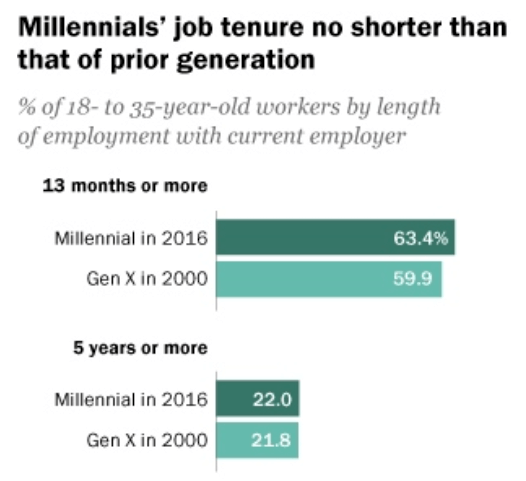Millennials in the workplace: How to manage and engage them

As of early 2019, the ages of millennials in the workplace ranged from 22 to 38 years old. This demographic represents the largest generation in the U.S. workforce, and that segment of the workforce will keep rising as previous generations slowly retire – in fact, they’re projected to make up 35 percent of the global workforce by 2020. (Fun fact: the number of millennials in China is higher than the entire U.S. population.)
So, not only are millennials starting to dominate the workplace, but they might currently be some of your most promising team members, or some of your company’s youngest managers. And they’re here to stay, as most have more than 25 years of work ahead of them (for me, it’s more like, sigh, 38).
You, of course, want to know how to manage millennials in the workplace – and also, how do you keep them engaged?
Contents
First, let’s dispel the myth
You may have heard a lot about the characteristics of millennials in the workplace; the terms “entitled,” “lazy,” “narcissistic,” and “disloyal job-hoppers” often come up. Yet, research supports the idea that millennials are not so very different than the previous generations, at least when it comes to what millennials want in a job.
For example, according to research published in Harvard Business Review (HBR), millennials, GenXers and Baby Boomers all want to “make a positive impact in their organization”, “help solve social/ environmental challenges” and “work with a diverse group of people” in equal measure.
Instead, the differences that are actually observed can be explained by age. HBR quotes a 2013 article written by Elspeth Reeve in The Atlantic:
It’s not that people born after 1980 are narcissists, it’s that young people are narcissists, and they get over themselves as they get older.
(Well… most of them, anyway.)
Even job-hopping, which is a habit attributed to millennials even by reliable ‘millennials in the workplace’ statistics, may actually pertain to young people instead of the entire generation. A study by the Pew Research Center suggests that millennials are as loyal to their employers as the preceding generation was at the same age.

So what do millennials value?
What most everyone else does: meaningful work, autonomy, recognition, feedback and development opportunities. Contrary to popular belief, there actually aren’t many unique problems with millennials in the workplace that need to be addressed.
That’s not to say that each generation isn’t different from the other. For example, the work values of millennials may differ in some cases — millennials might be less impressed by the size and longevity of a business and more by its positive reputation (something you should take into account when writing job ads to attract millennials). Also, in an episode of Inside Quest, author and organizational consultant Simon Sinek points out that the millennial generation has taken a hit to their self-esteem and ability to be patient due to their upbringing.
Still, people haven’t changed significantly in what motivates them in their job and what can help them succeed – both of which are areas that managers or HR should take into account to build a healthy workplace for everyone. To support people with wavering self-esteem who are impatient to succeed, don’t put them into a generational box. Rather, apply the same strategies across generations, including post-millennial generations (such as Gen Z).
How to manage and retain millennials in the workplace
A good management strategy will help you engage and retain all employees. Here are five tactics to consider for engaging millennials in the workplace:
Be accessible and approachable
The model of the unreachable manager who stays in the shadows while their team does the work is counter-productive. The manager who always complains and mopes is even more so. People need to feel that they’re being trusted and valued, and that you have a genuine interest in helping them develop and improve.
Make sure you have regular 1:1 time with each of your team members. Have an open-door policy to give them freedom to discuss anything – ideas, thoughts, complaints, aspirations. Involve them in your plans, if you can, and be transparent about your strategic decisions. Don’t be afraid to be persuaded by a good line of reasoning, even if you’re the final decision-maker and this feedback comes from people who report to you.
Give them the resources to thrive
Most people want to do their jobs well and productively. But to do that, they need adequate resources, like training and tools.
It’s a good idea to promote learning and development opportunities for your team members. Ask what your team’s training budget is and discuss the different options with your team members. Some might have found useful conferences they can go to, while others might prefer learning from books and online courses. If there are specific skills you want your team to acquire, do some research and suggest relevant courses or workshops.
One good thing about millennials is that they’re familiar with technology; they’re the first generation to spend the developmental years of their lives on the internet and portable gadgets. Despite the problems that this brings, (for instance, in the aforementioned Inside Quest episode, Simon Sinek referred to social media as addictive as alcohol), familiarity with technology means that people will be very receptive to technological tools that can improve their work. They might even recommend these tools to you, so you can try to implement them on a larger scale. Discuss options with your team members when you can.
Help them improve on the job
Wondering how to train millennials in the workplace? Conferences and courses are useful, but it’s also about making room for mistakes and feedback. Especially because millennials are still younger and thus less experienced when compared with the overall workforce.
Try effective methods such as:
- Giving feedback on specific pieces of work. For example, sit down with them to review that report they submitted and point out opportunities for improvement.
- Arranging for job-shadowing with you or others. The opportunity to see others in action can be effective as part of onboarding new colleagues, and also as a means to help team members gain additional skills.
- Sharing relevant content with them. That brilliant article you found on the future of machine learning? Don’t keep it to yourself; send it to your junior machine learning engineer along with some commentary. Be available should they wish to talk further about it, and make sure they know that discussion is a two-way street.
- Trusting them with extra duties occasionally. On-the-job training is most effective when there’s real challenge involved. If you think a team member is ready to try something new, give them a small project and let them try their hand. Step in to help if they need you to.
Provide for them
There are some things that are important to most people in a job, such as job security, living wages, important benefits and recognition for their work. These may not be entirely inside your control, but doing the best you can will certainly earn your team members’ trust and respect.
Praise your team members for a job well done. Push for salary levels to be equal or above market when possible. Be fair to all and combat your unconscious biases if you have to.
Benefits are a little harder to get. Ask around what other companies of your size and industry offer as benefits and suggest ways to stay ahead of the competition. For example, some companies have employee benefits like generous vacation and sick leave, paid parental leave and health insurance. Some are specifically trying to retain millennials by offering student loan repayment support – dubbed the hottest benefit of 2018 according to Forbes – and co-signing support for auto loans.
Support their future and purpose
Succession planning or internal mobility opportunities help your team members realize their aspirations, and it’ll be good for the organization as a whole for various reasons:
- Internal promotions can attract top talent. People will see that your team and organization truly value employee development.
- Employees will feel they have a future in the organization. This can make them less likely to want to change jobs.
- Employees will become stronger professionally. And they might bring more ideas, innovation and smarter work in their company.
Also, millennials want to feel their work has a purpose that goes beyond their own self-development. Make sure you explain how each project contributes to the customers’ lives or the company as a whole, whenever possible, and never leave your team members solely with mundane tasks.
Another aspect is to help millennials plan long term. As Sinek said in the episode of Inside Quest, technology has taught millennials to expect instant gratification:
You wanna buy something, you go on Amazon and it arrives the next day. You wanna watch a movie? Log on and watch it, you don’t have to check movie times. […] Everything you want, you can have instantaneously –except job satisfaction and strength of relationships; there ain’t no app for that.
While all young people can be thought of as impatient to succeed, millennials may not have been adequately taught to wait. So, if your millennial team members complain they’re not making an impact or they don’t see where their job is going:
- Sit down with them to create a long term plan for success.
- Show them how each step contributes to the big picture and their goals.
- Teach them by example to celebrate the work they put in individual tasks, instead of wanting to make huge impact at once.
In the end, what’s important when managing millennials in the workplace is to listen to your team members’ individual needs. All people want to have voice and support. So, keep asking your team members what they think is best for them and advise them accordingly. Meaningful working relationships make for easier retention and higher productivity, and your team members will thank you for it, whether they’re entitled millennials or not.
Frequently asked questions
- How do you recruit millennials in the workplace?
- Here are four ways to make sure you attract and recruit the best candidates for your company: Give them a sense of purpose; Offer opportunities for growth that don't stop with their first promotion or award; Get social by asking about what interests each person has outside work; Have an open dialogue about which values fit into this role best to attract the best candidates.
- How do you hire and retain millennials?
- The company needs a culture where people feel like they are treated professionally and fairly for the work that has been done to create trust between co-workers or customers, which leads to professional development opportunities as well as defense against burnout.
- What do millennials want from their employers?
- When looking for a new job, three-quarters of workers said that work-life balance and learning opportunities were important. They also want to have remote or hybrid jobs, and they are willing to turn down offers that don't match up values.




